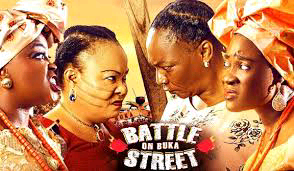The Nigerian film industry tagged Nollywood is famed to be the second largest film industry in the world as we speak. As of 2023, Nollywood is only second in terms of volume to Bollywood (the Indian film industry). Surprisingly, both Nollywood and Bollywood have overtaken the globally-acclaimed and highly popular American film industry, Hollywood, by volume.
As of 2023, Nollywood – the Nigerian film industry is reported to produce more than 2,500 movies every year. And it has generated over 6.4 billion US Dollars in revenue. Nollywood has also provided jobs for over 200,000 people, and its films are watched in over 50 countries in Africa and internationally.
The Nigerian film industry did not emerge by accident. It was laid on the foundation of native drama – which emerged out of traditional dance-drama rituals that existed as far back as the 16th Century. Nigerian ethnic groups such as the Yoruba, Kanuri, Kalabari/Efik, Hausa, Tiv, Igala and Urhobos celebrated their traditional festivals partly through these religious dance-dramas.
The Origins Of the Nigerian Film Industry – Nollywood
From humble beginnings of the enterprising Yoruba traveling dance-drama theatre groups of southwest Nigeria, which became popular in the 1940s. The Nigerian film industry was largely built on the foundation of the Yoruba traveling dance-drama theatre groups.
These dance-drama groups learnt their acting skills from the Alarinjo – ceremonial masked masquerades (Eegun Alárè) of ancient Yorubas. They successfully combined it with ideas borrowed from the colonial Roman Catholic plays (and other missionary churches) of that time. The travelling dance-drama groups were also partly modeled on the colonial British and European operas imported into the country.
Drama troupe leaders and pioneer film makers such as Hubert Ogunde, Kola Ogunmola, Oyin Adejobi, Duro Ladipo and Moses Olaiya emerged beginning from 1945. About a dozen of these traveling theatre groups existed then, moving from town to town to perform plays in Yoruba.
Needless to say that right from the beginning, Nigerian dramas, screenplays and films have been heavily infused with tradition and satire. From traditional folklore, to celebration of culture, ancient history, native wisdom and satire, laced with proverbs, dance and music.
Nollywood: Its Emergence on The Global Film Scene
Between the 1960s and 1980s, some of these theatre groups succeeded in taking their plays into the budding cinema houses of those times. Then they eventually took their plays onto television screens. Thus they gradually gained more patronage from Nigerian film lovers. In due course of time, these theatre groups were able to record their plays on set with simple video cameras.
The likes of Herbert Ogunde, Eddie Ugboma, and Ola Balogun started the rudimentary forms of video film production soon after Nigeria’s independence. Later on, they learnt to mass-produce their plays cheaply on video cassettes for sale, and ran on low budgets.
Then came the determined video film producers and scriptwriters of southeastern Nigeria, who joined the race. Present-day Nollywood began its true journey to fame in 1992, thanks to the works of the likes of Kenneth Nnegbue. Nnegbue produced the first-ever Nigerian feature film, Living in Bondage, in 1992. In spite of the limited funding and poor quality of production, the film was a success. The Nigerian audience openly endorsed it.
In fact the 2019 sequel of the same movie, Living in Bondage: Breaking Free eventually generated 406,257 US Dollars from a meagre budget of 24,081 US Dollars. Living in Bondage was the first film produced with video cameras and shot on set with a low budget. The films were recorded straight into video cassettes. But it encouraged other producers to follow the same model. Getting funding and support for screenplays and early video films at that time was practically non-existent. Nevertheless, both films by Kenneth Nnegbue shot Nigeria into international recognition in the film industry.
Nigerian Film Industry: Achievements So Far
Nigerian films are now being viewed in several African nations and in the diaspora – as far as Europe, USA and Asia. Online streaming platforms such as Netflix, and cable TV stations (e.g. African Magic) have enthusiastically supported the promotion of Nollywood projects in recent times.
That is no surprise, owing to how much these hitherto cheaply-produced Nollywood films have gained so much patronage home and abroad. And surprisingly larger revenues by the day. Nigerian movie producers achieved this in spite of poor funding, distribution headaches and film piracy issues back then.
Furthermore, there is now more funding support for movie productions by banks and other investors – for the same reasons. Nollywood films are raking in millions in revenue, and it gets larger every year – it’s hard not to see it. Improved funding has equipped movie producers with advanced video equipment, enhanced distribution channels (both online and offline) and promotion through modern cinema houses.
Success
All these have further improved the earnings, production quality, and diversified story lines of these movies. They are now more sophisticated and even more interesting. Modern Nollywood movies are a bouquet of comedies, thrillers, adaptation of modern-day challenges, horror, history, tradition, and romance. They are even subtitled in different languages. Ọmọ Ghetto: The Saga; Battle on Bukka Street; The Wedding Party; Ije; Ijakumo: The Born Again Stripper; Half of a Yellow Sun; Lionheart and others, are some of the most ambitious and successful Nollywood projects in recent times. In fact, their box office success stories have gone far beyond Africa, and broken unbelievable records in revenue and patronage.
What’s more, Nigerian actors and actresses are now well paid, and more carefully groomed for their roles. Some of the highest-paid actors and actresses now earn millions of Naira per role. That is in addition to signed endorsements and ambassadorial deals many of them enter into, with prestigious companies and organizations.
We can conclude that indeed, the sky is just the beginning for Nollywood. The best is yet to come.
